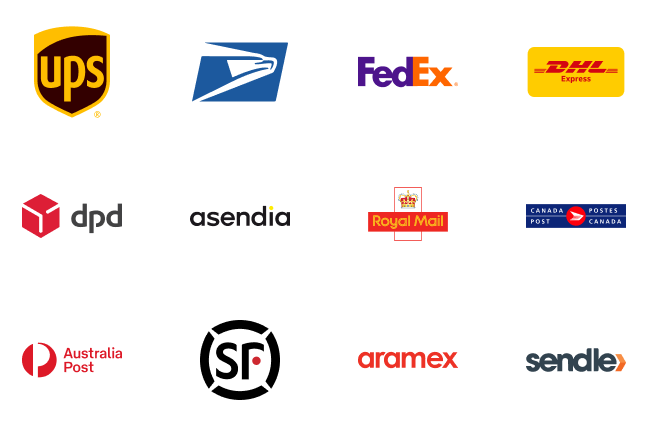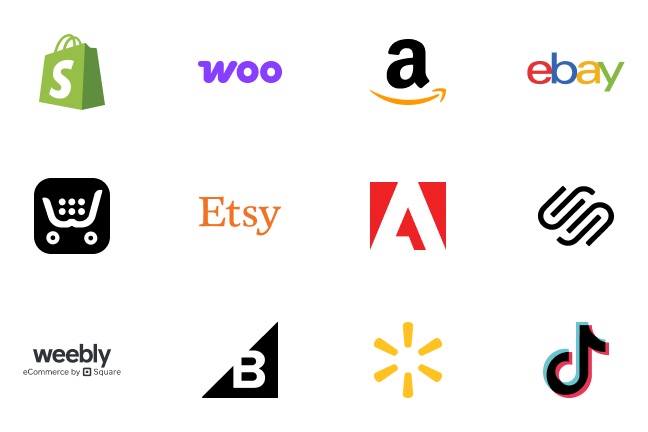The Basics of Fulfillment
What is fulfillment?
Fulfillment is the process of receiving, storing, packaging, and shipping out your products to customers.
Types of order fulfillment
The three most popular fulfillment processes in eCommerce are:
Merchant fulfillment:
As a store owner, you or your employees are responsible for stocking, taking orders, invoicing, storing, and shipping your products.
| Advantages |
Disadvantages |
| Gives you a hands-on approach to your business and can save on costs. |
You'll save money but lose time. Packing items can be time-consuming when you have many orders. |
| Oversee how your shipments are packaged. |
You'll need a centralized system to keep track of everything. |
| Maintain full control over shipping and make last minute changes if needed. |
It's not a scalable solution and it's only possible if you have low volumes. |
Dropshipping:
Work directly with a supplier to distribute the supplier's product. You sell to and accept orders from customers, while the supplier is responsible for stock, packaging, and shipping to the customer.
| Advantages |
Disadvantages |
| Requires very little investment. |
Very competitive and hard to be profitable. |
| You don't have to deal with logistics. |
You have no control over the shipping solutions, as the supplier decides this. |
| You don't have to find a place to store the products. |
When selling someone else's product, you won't have direct access to it so you can't guarantee quality. |
|
You'll need a centralized system to keep track of everything. |
|
It's not a scalable solution and it's only possible if you have low volumes. |
Third-party fulfillment:
Also known as 3PL (third-party logistics), an order fulfillment company will be responsible for storing your goods, processing your incoming orders (pick & pack), and shipping them on your behalf.
Learn more about order fulfillment.
| Advantages |
Disadvantages |
| Opportunity to ship from multiple warehouses in strategic domestic and international locations |
Highly customized packaging (like handwritten notes to recipients) is considered a value-added service that you will pay extra for. |
| Access to same-day dispatching services if needed |
There's a range of services and prices to consider, making it important to take the time to research before committing. |
| Have full-time packers professionally package your items. |
You will have to arrange a transfer of your goods to the warehouse at an additional cost. |
| Easier to manage your finances as handling fees provide exact costs (versus calculating your own time as cost, which is difficult to measure) |
|
| No need to learn complex operational processes. |
|
| Requires little investment in manpower, storage space, and technology. |
|
When is it time to hire a 3PL?
- You're processing more than 100 shipments per month.
- You lack the resources and assets needed to run a centralized warehouse of your own.
- The factory where you source your products are near popular fulfillment hubs such as Hong Kong, Singapore, the Netherlands, and the midwest US.
Learn more about third-party eFulfillment, and if it's right for you.
Choosing a 3PL
Whether you're crowdfunding or your online store is growing, here's what you should consider when you're looking to work with a 3PL.
Location: The warehouse's location can impact tax & duty for your business. Is the warehouse in close proximity to your target market?
Services: What are their Service Level Agreements (SLA) on receiving, fulfillment, and returns disposition? What kind of shipping solutions do they offer, and how many? What is their packing service like? Can they handle bulk shipments? Do they offer value-added services beyond standard warehouse activities?
Technology: Is their warehouse management system up to date? How automated and efficient are they in fulfilling orders?
Global fulfillment
Global fulfillment is when you store your products in an overseas warehouse, making it easier to reach your international customers. This method can cut costs in a variety of ways:
- Lower shipping costs for your customers. By choosing a warehouse that is closer to your clients, delivery times will be shorter and shipping costs lower.
- Lower transportation costs from your manufacturer. Logistically, it may make more sense to have a warehouse that's closer to your manufacturer so you can save on transporting your products.
- Avoid tax & duty issues. Better service your international clients by fulfilling orders within the same country or continent where they're located. This removes the burden of customs clearance for the customer.
Here are more reasons why you should consider global fulfillment.
Easyship also gives you access to a network of global warehouses.
The Basics of Warehousing
What are warehouses?
Warehouses are spaces where you can store products you are selling until they are ready to be sent to your customer.
Types of warehouses
You can expect major operational differences between warehouses depending on what kind of businesses they cater to.
B2B: (Business to Business) These warehouses specialize in handling recurring, bulky orders.
B2C: (Business to Consumer) These warehouses specialize in handling a large number of orders at a time. Orders are usually smaller in size and weight compared to B2B orders.
Bonded: These are secured warehouses where VAT and duties are deferred until they leave the warehouse.
Omni-Channel: These warehouses offer fulfillment solutions for B2B, B2C, and Big-Box retailers with stringent compliance requirements.
Learn more about B2B and B2C warehouses
Warehouse fees
Warehouses offer many services to ensure your storage and fulfillment needs are met. Here are some common order fulfillment costs you may come across when getting a quote:
Account onboarding: Fees associated with setting up a new customer.
Inbound handling: Fees for any service related to delivering your goods to the warehouse.
Storage: These can be charged based on different areas (such as floor-stored, bulk rack locations, pick locations, etc.) and the types of storage, such as temperature controlled or dangerous goods regulation (DGR).
Pick and Pack: Fees associated with picking an item and packing it for shipping. This fee can be charged per unit, carton, or pallet.
Depending on your needs, you can also request value-added services such as:
Barcode labelling: Attaching barcode labels to all of your items.
Engraving: Some warehouses can engrave items for a personal touch.
Gift wrapping: Have items gift wrapped for special occasions.
Kitting: Process in which individually separate but related items are grouped, packaged, and supplied together as one unit.
Printing: Invoices can be printed for you.
Refurbishment: Checking returned items and bringing them back to sellable condition.
Retail compliance: Process of generating UCC-128 labels, transacting activity in a retailer's portals, and all other activities needed to conform with a retailer's requirements to avoid chargebacks.
Temperature controlled storage
For a more in-depth list of fees you can expect from a warehouse, check out our blog post understanding warehouse quotes.
Do a warehouse visit
We highly recommend taking the time to visit warehouses you are interested in before you make a final decision. This is your opportunity to assess the quality of the warehouse and to ask questions to ensure your business standards are met.
Here are 10 mistakes you should avoid with warehouses
{{ fulfillment-experts }}
Warehouse partners
Easyship works with multiple warehouses around the world so you can fulfill orders anywhere! Learn more about our partners:
- WSSN (Netherlands, EU)
- FMCGL (Hong Kong)
- Moduslink (USA)
Full list
Automation in Warehousing
How Easyship automates warehousing
Need another reason to consider using a 3PL? How about not having to lift a finger to fulfill your orders?
At Easyship, we've found a way to completely automate your warehousing and shipping needs. Here's how it works:
- Let our system know what couriers you want to use. You can do this by either installing our Rates at Checkout feature, which will automatically choose the best couriers for your customer, or create shipping rules if you have additional preferences.
- Enter your product information in our Products feature. By entering information such as the SKU, product name, dimensions, and weight, Easyship will be able to provide the most accurate quote for your shipment. You'll only need to do this once.
- Easyship will automatically sync your orders daily. Couriers will be chosen based on the Checkout options, or your shipping rules. All required shipping documents will be automatically generated, and they along with the order details will be sent to the warehouse for fulfillment every day.
- The warehouse will pick, pack, and ship your orders. All of this can happen while you're sleeping, working on your marketing strategy, watching your sales go up… you get the gist.
{{ fulfillment-download-guide }}
When It's Time For a Change
Is it time to switch?
If you're having doubts about your current fulfillment partner, perhaps it's time to consider a switch. Think about the following:
- Capacity: Is your business growing quickly and you're finding they are lacking the space you need?
- Quality of service: Are their accuracy rates declining? Are they failing to meet your standards?
- Cost competitiveness: Do you think you are overpaying on warehouse fees?
You should also take into account the additional costs needed to move your inventory elsewhere, in addition to how your downtime will affect your sales opportunities.
What else to consider when switching warehouses.


















































.avif)
.avif)

.avif)
.avif)


.avif)


.avif)










.avif)
.avif)



.avif)
.avif)


.avif)
.avif)


.avif)





